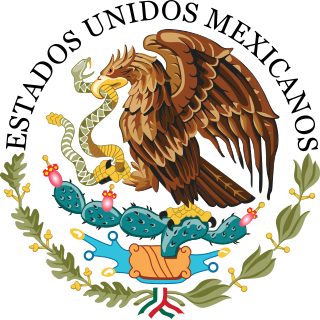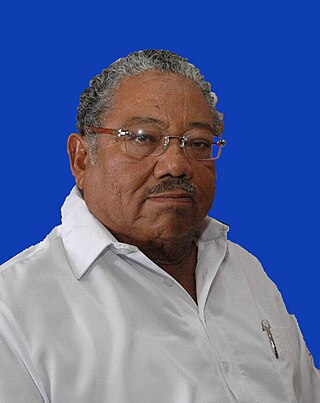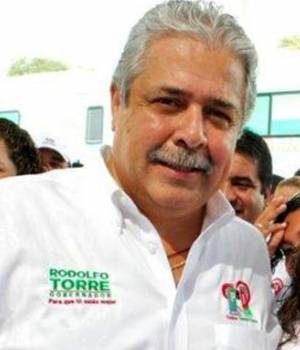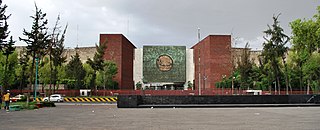
The politics of Mexico function within the framework of a federal presidential representative democratic republic whose government is based on a multi-party congressional system,where the President of Mexico is both head of state and head of government. The federal government represents the United Mexican States. It is divided into three branches:executive,legislative,and judicial,established by the Political Constitution of the United Mexican States,published in 1917. The constituent states of the federation must also have a republican government based on a congressional system established by their respective constitutions.

The Institutional Revolutionary Party is a political party in Mexico that was founded in 1929 as the National Revolutionary Party,then as the Party of the Mexican Revolution and finally as the PRI beginning in 1946. The party held uninterrupted power in the country and controlled the presidency twice:the first one was for 71 years,from 1929 to 2000,the second was for six years,from 2012 to 2018.

Dulce María Sauri Riancho is a Mexican politician who was the first woman to serve as governor of Yucatán,from 1991 through 1994. She served as a congresswoman during the 64th Congress (2018–2021),during which she was also the President of the Chamber of Deputies. During her tenure as governor,reforms which restructured the Henequen industry in Yucatán were implemented. The toll road between Mérida and Cancún was also built and became operational during her administration.

The LX Legislature of the Congress of Mexico met from September 1,2006,to September 1,2009. All members of both the lower and upper houses of Congress were elected in the elections of July 2006.

General Manuel Pérez Treviño was a Mexican politician and was an important military and political leader during and after the Mexican Revolution.

General elections were held in Mexico on 21 August 1994. The presidential elections resulted in a victory for Ernesto Zedillo of the Institutional Revolutionary Party (PRI),whilst the PRI won 300 of the 500 seats in the Chamber of Deputies and 95 of the 128 seats in the Senate. Voter turnout ranged from 77.4% in the proportional representation section of the Chamber elections to 75.9% in the constituency section.

Jesús Martínez Ross is a Mexican politician belonging to the Partido Revolucionario Institucional (PRI). From 1973 to 1975,he held a seat in the Chamber of Deputies,representing Quintana Roo's First District. Between 1975 and 1981 he served as the first elected governor of Quintana Roo following statehood.
Humberto Roque Villanueva is a Mexican politician affiliated with the Partido Revolucionario Institucional (PRI). He was born in Torreón,Coahuila.

Rodolfo Torre Cantú was a Mexican physician and politician. He held a number of public offices,such as Federal deputy,Secretary of Health of Tamaulipas and Director-general of the DIF in Ciudad Victoria. While running for governor of Tamaulipas as the candidate of the PRI,he was assassinated,apparently by agents of a drug cartel. Torre was murdered alongside a Tamaulipas lawmaker,Enrique Blackmore,on 28 June 2010 near Ciudad Victoria,which is approximately three hours south of Brownsville,Texas. Felipe Calderón promised a full investigation,saying,"the fight against drug cartels must continue". He further stated,"This was an act not only against a candidate of a political party but against democratic institutions,and it requires a united and firm response from all those who work for democracy." Torre's assassination is the "highest-profile case of political violence" in Mexico since the murder of Luis Donaldo Colosio.
Melquíades is a Spanish given name. It is the Spanish form of the Greek name Melchiades,as in Pope Miltiades.

The Permanent Conference of Political Parties of Latin America and the Caribbean is an international organization of political parties in Latin America and the Caribbean. It was created at the behest of the Institutional Revolutionary Party on 12 October 1979 in Oaxaca,Mexico,and brings together liberal,social democratic,Christian democratic,and other leftist political parties. Its first president (1979–1981) was Gustavo Carvajal Moreno of Mexico (PRI). Its current president is the Mexican politician Alejandro Moreno Cárdenas (PRI).
Javier García Paniagua was a Mexican politician who served as president of the Institutional Revolutionary Party (PRI) in 1981 and held positions in the cabinet of President JoséLópez Portillo as Secretary of Agrarian Reform and Secretary of Labor and Social Welfare.
Lisbeth Hernández Lecona is a Mexican politician affiliated with the Partido Revolucionario Institucional (PRI). She currently serves as senator of the LXII Legislature of the Mexican Congress,representing Morelos.
Abel Octavio Salgado Peña is a Mexican politician affiliated with the Partido Revolucionario Institucional (PRI). Between August 29,2012 and August 31,2015,he served as Deputy of the LXII Legislature of the Mexican Congress representing Zapopan,Jalisco.
Events in the year 1999 in Mexico.

Fernando Morales Martínez is a Mexican politician. Previously affiliated with the Institutional Revolutionary Party (PRI),he switched to the Citizens' Movement (MC) party in 2017 when he was threatened with expulsion.
Cora Amalia Castilla Madrid is a Mexican politician and activist. A member of the Partido Revolucionario Institucional (PRI),she was municipal president of the municipality of Othón P. Blanco from 2005 to 2008,President of the PRI in Quintana Roo from 2009 to 2011,and has been Secretary of Culture of the State Government of Quintana Roo and Deputy in the Congress of Quintana Roo twice.

The LV Legislature of the Congress of the Union of Mexico met from 1 September 1991 to 31 August 1994.

Marco Antonio Mena Rodríguez is a Mexican politician from the Institutional Revolutionary Party,Governor of Tlaxcala from January 2017 to August 2021. He won the 2016 gubernatorial elections after previously serving in several administrative positions as well as being a deputy to the state congress.

The LIV Legislature of the Congress of the Union of Mexico met from 1 September 1988 to 31 August 1991.













